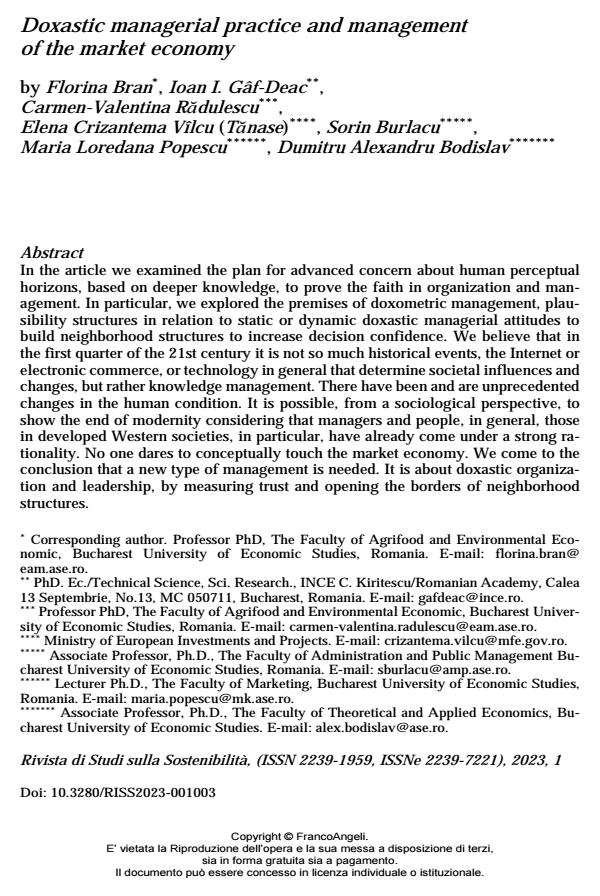Doxastic managerial practice and management of the market economy
Journal title RIVISTA DI STUDI SULLA SOSTENIBILITA'
Author/s Florina Bran, Ioan I. Gâf-Deac, Carmen-Valentina Radulescu, Elena Crizantema Vîlcu (Tanase), Sorin Burlacu, Maria Loredana Popescu, Dumitru Alexandru Bodislav
Publishing Year 2023 Issue 2023/1
Language English Pages 34 P. 29-62 File size 372 KB
DOI 10.3280/RISS2023-001003
DOI is like a bar code for intellectual property: to have more infomation
click here
Below, you can see the article first page
If you want to buy this article in PDF format, you can do it, following the instructions to buy download credits

FrancoAngeli is member of Publishers International Linking Association, Inc (PILA), a not-for-profit association which run the CrossRef service enabling links to and from online scholarly content.
In the article we examined the plan for advanced concern about human perceptu-al horizons, based on deeper knowledge, to prove the faith in organization and management. In particular, we explored the premises of doxometric management, plausibility structures in relation to static or dynamic doxastic managerial attitudes to build neighborhood structures to increase decision confidence. We believe that in the first quarter of the 21st century it is not so much historical events, the Inter-net or electronic commerce, or technology in general that determine societal influ-ences and changes, but rather knowledge management. There have been and are unprecedented changes in the human condition. It is possible, from a sociological perspective, to show the end of modernity considering that managers and people, in general, those in developed Western societies, in particular, have already come under a strong rationality. No one dares to conceptually touch the market econo-my. We come to the conclusion that a new type of management is needed. It is about doxastic organization and leadership, by measuring trust and opening the borders of neighborhood structures.
Keywords: belief, doxastic management, neighborhood structures, knowledge manage-ment.
- Baltag A. and Moss L.S. (2004). Logics for Epistemic Programs. Synthese, 139(2): 165-224.
- Bergson H. (1998). Creative Evolution. Bucharest: Ed. Institutul European, p. 137.
- Blaga L. (1946). The Trilogy of Values: Science and Creation, Magical Thinking and Religion, Art and Value, reed. 2013. Bucharest: Ed. Humanitas, pp. 7-8.
- Bourdieu P. (1986). The forms of capital. In: J. Richardson (Ed.). Handbook of Theory and Research for the Sociology of Education. New York: Greenwood, pp. 241-258.
- Carnap R. (1950). Empiricism, Semantics, Ontology. Revue Internationale de Philosophie, 4: 20-40.
- Drucker P.F. (2000). Managing Knowledge Means Managing Oneself. Leader to Leader, New York, 16.
- Gauchet M. (1999). The Disenchantment of the World: A Political History of Religion. Princeton University Press, in Abstract.
- Gâf-Deac I. (2013). Fundamentals of doxastic management. Bucharest: Free Mind Publishing.
- Gâf-Deac I. (2001). Structural development of modern technologies. Bucharest: All Beck.
- Gâf-Deac I.I. et al. (2016). About the of disciplinary content of doxastic management. Annals of S.H. Economic Series, [S.l.], 16(2): 11-22, July. -- Available at: http://anale.spiruharet.ro/index.php/economics/article/view/1622. Date accessed: 13 july 2021, http://ssrn.com/abstract=2809081.
- Kozlowski S.W.J. and Klein K.J. (2000). A multilevel approach to theory and research in organizations: Contextual, temporal, and emergent processes. In K.J. Klein and S.W.J. Kozlowski (Eds.). Multilevel theory, research and methods in organizations: Foundations, extensions, and new directions, pp. 3-90. San Francisco, CA: Jossey-Bass.
- Maffesoli M. (2007). Le réenchantement du monde. Paris: Ed. La Table Ronde.
- Prior A. (1949). Logic and the Basis of Ethics. Oxford University Press.
- Rescher N. (2005). Epistemic Logic: Survey of the Logic of Knowledge. University Pittsburg Press.
- Rescher N. (1977). Methodological Pragmatism: A Systems-Theoretic Approach to the Theory of Knowledge. Basil Blackwell, New York University Press.
- Rimbaud A., Correspondance, À Georges Izambard, 13 mai 1871.
- Ryan T., McKay D. and Dennett C. (2009). The evolution of misbelief. Behavioral and Brain Sciences, 32: 493-561.
- Samuelson P.A. (1954). The Pure Theory of Public Expenditure. The Review of Economics and Statistics, 36(4), Nov., 387-389.
- Schwitzgebel E. (2010). Belief, in Zalta E.N. (Ed.). The Stanford Encyclopedia of Philosophy, Stanford: Stanford University, p. 2.
- Steup M. (2003). Knowledge, Truth, and Duty: Essays on Epistemic Justification, Responsibility, and Virtue. Print, Published to Oxford Scholarship Online: November.
- Tylor E.B. (1898). Three Papers. London: Harrison and Sons.
- Verheyen G. (2014). Empirical Management Explored Evidence-Based Management for Software Organizations. Scrum.org, Boston, Massachusetts, Whitepapers, p. 1.
- Weber M. (1947). The theory of economic and social organization. New York: Trans. AM Henderson and Talcott Parsons.
- Weber M. (2016). Doxastic and Epistemic Logic, Edited by Mark Jago, Nottingham University -- http://philpapers.org/. Centre for Digital Philosophy, Philosophy Documentation Center.
- Weber M. (2004). Merriam -- webster.com/dictionary/doxology, The Merriam-Webster Dictionary.
- The Impact of the Geopolitical Situation on Inflation in the Current Period Oana Camelia Iacob Pargaru, Romeo Catalin Cretu, Răzvan Marian Pîrcălăbescu, Daniel Soldan, in Proceedings of the International Conference on Business Excellence /2025 pp.5307
DOI: 10.2478/picbe-2025-0406
Florina Bran, Ioan I. Gâf-Deac, Carmen-Valentina Radulescu, Elena Crizantema Vîlcu (Tanase), Sorin Burlacu, Maria Loredana Popescu, Dumitru Alexandru Bodislav, Doxastic managerial practice and management of the market economy in "RIVISTA DI STUDI SULLA SOSTENIBILITA'" 1/2023, pp 29-62, DOI: 10.3280/RISS2023-001003